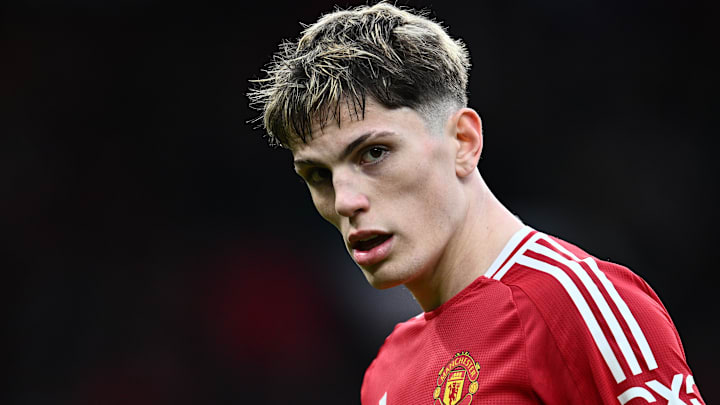The transfer market always brings stories that could have taken a completely different turn. One of them involved a young talent who has been gaining more and more attention: Alejandro Garnacho. During the final days of the winter window, the Argentine came close to leaving Manchester United, but the deal finally did not materialize.
Follow Playing for 90 on X (Twitter).
Napoli, like giants such as Tottenham and Chelsea, were keen on the player, but the Italian club's chief, Giovanni Manna, revealed that the negotiations did not go through for one decisive factor: the player's salary demands.
Highly sought-for talent, but still developing
Interest in Garnacho was not an accident. The young forward showed his potential, and this season already played 36 games in which he scored eight goals and provided six assists. Not bad for a player who is just finding his place in the first team.
But not everything is perfect. United's manager, Rúben Amorim, has already made it clear that the Argentine is part of his future plans but with one more challenge: he needs to learn to play differently.
It may mean different things, either that the coach wants him to be more complete, less predictable, and more a team player; or it could be a signal that, with all his talent, Garnacho has not reached the tactical maturity required to be an undisputed starter.
The question is that while he adapts, there are clubs willing to give him a bigger role right now. That was the scenario in which Napoli tried to bring him to Italy.
The salary was an issue, but did Garnacho really want to leave?
The official version from Napoli is that the deal fell through due to the Argentine's salary demands. A player of his profile-young and promising-knows full well his market value is on the rise and wants to be compensated accordingly. But another important detail in this equation was whether Garnacho really wanted to leave?
The fact that one thing is for a club to approach him, make offers, and even discuss numbers, another thing is for the player himself to push for an exit. And from what was known, he wasn't exactly pressing to leave.
United didn't seem desperate to sell him either, which already says a lot about how the club sees his future. If there had been an internal desire to get rid of the Argentine, the deal might have moved forward, even with the salary difficulties.
Did Napoli miss an opportunity or avoid a problem?
An instant replacement was needed, as Napoli had lost Khvicha Kvaratskhelia to Paris Saint-Germain for £59 million. A Georgian talismanic player whose absence left an open hole inside Napoli, needed to be covered.
Could Garnacho have been that replacement? Yes, but there are doubts. First, because he hasn't reached the level of Kvaratskhelia yet. Adaptation to Italian soccer might have been an issue, and there wouldn't have been enough time for it. Napoli needed an immediate replacement-a player ready to influence the team without having a long adaptation period.
Second, if salary was already a problem now, imagine later? If the club had agreed to pay more than it wanted, it would have set a precedent for future difficult negotiations.
In the end, Napoli may have missed out on a talented player, but they avoided a possible financial headache.
Did United make the right call by keeping Garnacho?
Coming to Manchester United, the question still remains: did the club make the right decision in keeping the Argentine in their books? On one hand, yes, he is still developing and could grow much more within the club. Furthermore, selling him now could have been a mistake as he could be worth much more in the future.
But, in all fairness, selling him would also not have been farfetched. If Garnacho does not fit into the coach's future plans or does not evolve as expected, he will be a lost opportunity while staying. It was a hot market, and there was interest from clubs willing to invest in him.
The future is not certain, but the decision to keep him means that at least Manchester United believes in his potential. Now, it's upon him to justify that belief on the pitch.
